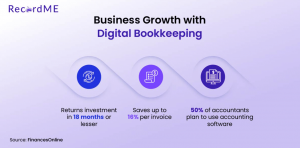Digital Bookkeeping: A Must-Have for Banks, eCommerce & Digital Wallets

In This Post
Automation generally tends to induce a fear of job security in people. For accountants, it represents freedom from repetitive and time-consuming data entry tasks. Accounting is not a last-second effort to save taxes. Instead, it involves continuous planning and analyses for the optimal functioning of a business. Therefore, the monotony can lead to data inconsistencies and errors. Industries that conduct high-value transactions, including banking, eCommerce, and digital wallets, are at greater risk due to these errors. Accounting automation aims to help accountants streamline their processes and be more productive. Hence, they can focus on strategic and decision-making tasks rather than wasting time on tedious data entry. Although digital bookkeeping benefits all sectors, banks, eCommerce, and digital wallets stand to gain the most.
Digital Bookkeeping for Banks
Whether it be domestic money transfers or international transactions, banks represent the gateway to digital payments. Due to the vital nature of this industry, customers demand an immaculate and secure service. However, banks tend to attract cybercriminals and money launderers as well. This is why international authorities and watchdogs enforce stringent compliance regulations on these institutions. Traditionally, it falls on the accounting department to maintain and regulate transactions. Even a team of experienced accountants cannot keep up with the rising number of digital payments. Therefore, banking institutions rapidly utilize accounting automation to stay ahead of the competition.
- According to Accounting Today, the global market for online accounting software will reach $11.7 billion by 2026.
- Capital Counselor estimates that the US market for online accounting services will exceed $416 million by 2024.
- Moreover, 78% of SMEs already used cloud-based digital bookkeeping to streamline their accounting processes in 2020.
Boost Efficiency
The primary goal of automation in any industry is to streamline mundane processes, increasing efficiency and productivity across all departments. It becomes impractical for accountants to keep up with the millions of transactions daily. Yet, they also have to keep a check on fraud detection and compliance regulation. Therefore, orchestrating automated accounting with the existing system becomes the only viable option to increase efficiency. Automating repetitive processes allows human resources to focus on more critical decision-making tasks.
Suggested Reading: Top 10 Ways AI Automated Bookkeeping Solutions Boost Work Efficiency
Enhance Customer and Employee Experience
Since the world is going global, modern customers demand a clean and swift experience. However, the efficiency and accuracy of manual processes tend to decrease as the workload increases. On the other hand, having a finance bot that can process multitudes of transactions in a moment allows the banks to provide better customer service. Similarly, the removal of repetitive tasks provides job satisfaction to the employees. Banking institutions can then utilize the talent to perform higher-value work.
Digital Bookkeeping for eCommerce
In 2019, online sales in the US were $500 billion, a small percentage of the total retail market in the US. However, the Covid pandemic dramatically shifted the paradigm, focusing on eCommerce. Due to the sudden change in consumer behavior, online sales crossed the $1 trillion mark in 2022 for the first time in history. However, this change introduces friction in the system due to the prevalent legacy processes. The industry can no longer maintain the rising number of transactions manually. Accounting automation can help eCommerce break the boundaries of human limitations and achieve superior accuracy and growth momentum.
Stay Ahead of Cash
Cash payments are slowly getting obsolete due to the rising demand for digital payment gateways. However, this represents a challenge and an opportunity for the eCommerce industry. The inability to accurately monitor and track digital payments can result in monetary and legal issues for online businesses. Accounting automation allows these stores to avoid these troubles by minimizing human error. Moreover, digital bookkeeping goes hand-in-hand with the digital revolution. Thus, allowing the companies to maintain a growth pace with their competitors.
Make Better Business Decisions
The biggest drawback of manual automation in eCommerce is the lack of accuracy and efficiency. These errors can paralyze the decision-making processes of businesses. Moreover, the spike in online sales challenged the industry to introduce a more robust solution for accounting. Despite their best efforts, human talent cannot keep up with the workload. Online bookkeeping services can help reduce these inaccuracies and provide accurate financial reports to make informed decisions.
Digital Bookkeeping for Digital Wallets
Online bookkeeping services are challenging the norms of traditional accounting. They are designed to replace manual data entry and categorization of financial data. Apart from it, digital wallets are another area that represents a generational shift in the payment system. Due to the rise of e-payments and cryptocurrency, digital wallets are the new standard for online transactions. Therefore, it is only natural that companies should integrate digital wallets with automated bookkeeping. The most significant advantage of this integration is that it allows accountants to review clients’ financial data and transaction history quickly.
Ensure Compliance
Digital wallets are a crucial part of the finance departments of any organization, especially in the post-Covid world. However, the ease for customers that comes with these wallets translates to more regulations for the companies. To overcome these issues, digital bookkeeping eliminates manual data entry and introduces OCR-powered automatic data gathering. Therefore, the time from data collection to processing reduces dramatically, allowing faster overall performance.
Real-Time Integration
The shift to digital payments and wallets allows companies to extract and process data in real time. Since time is of the essence in this digital world, digital bookkeeping services can enable companies to produce invoices, payroll data, and vouchers directly into the wallets.
RecordMe – Your Partner in Automated Accounting
RecordMe does not aim to be the generic automation software. Instead, we constantly strive to be your partner in growth, allowing you to scale without any worries by providing you with an end-to-end AI finance bot.
Our software collects and processes data for you, removing any human error. Furthermore, it generates timely reports so that you can make prompt decisions for the future of your business.
RELATED BLOGS
Search Blog
Category





